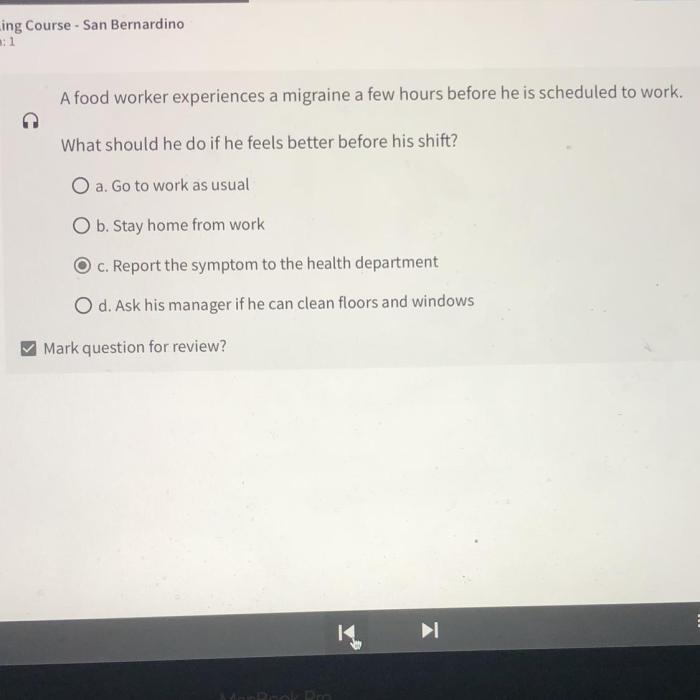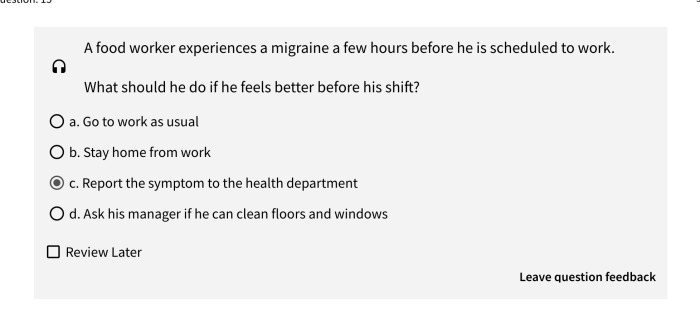When a food worker vomits a few hours before work, it raises significant concerns about food safety and public health. This article delves into the potential consequences, ethical implications, and best practices for handling such situations, providing valuable insights for food industry professionals and consumers alike.
Foodborne Illness Overview
Foodborne illness, also known as food poisoning, is a major public health concern worldwide. It occurs when harmful microorganisms or their toxins are ingested through contaminated food or beverages. The potential causes of foodborne illness are diverse, including bacteria, viruses, parasites, and toxins produced by microorganisms or plants.
Common examples of foodborne illnesses include:
- Salmonella
- Escherichia coli (E. coli)
- Campylobacter
- Listeria monocytogenes
- Norovirus
- Clostridium botulinum
According to the World Health Organization (WHO), foodborne illnesses affect an estimated 600 million people globally each year, resulting in approximately 420,000 deaths.
Symptoms of Foodborne Illness: A Food Worker Vomits A Few Hours Before
The symptoms of foodborne illness can vary depending on the specific microorganism or toxin involved. However, common symptoms include:
| Symptom | Severity |
|---|---|
| Nausea | Mild to severe |
| Vomiting | Mild to severe |
| Diarrhea | Mild to severe |
| Abdominal cramps | Mild to severe |
| Fever | Mild to high |
| Headache | Mild to severe |
| Muscle aches | Mild to severe |
| Fatigue | Mild to severe |
The timeframe for symptom onset after consuming contaminated food can vary from a few hours to several days, depending on the microorganism or toxin involved.
Transmission of Foodborne Illness

Foodborne illness can be transmitted through food handlers who contaminate food during preparation, storage, or serving. Specific examples of how food workers can contaminate food include:
- Poor personal hygiene, such as not washing hands properly or wearing gloves
- Handling food with bare hands when preparing raw meat, poultry, or seafood
- Cross-contamination, such as using the same cutting board for raw meat and produce
- Improper storage of food, such as leaving food at room temperature for extended periods
- Not reheating food to a safe internal temperature
Statistics indicate that food handlers play a significant role in foodborne illness outbreaks. According to the Centers for Disease Control and Prevention (CDC), food handlers are responsible for approximately 58% of foodborne illness outbreaks in the United States.
Prevention of Foodborne Illness

Food safety practices are essential for preventing foodborne illness. Food workers have a crucial role in maintaining food safety by following best practices, such as:
- Practicing good personal hygiene, including washing hands frequently and wearing gloves when handling food
- Separating raw meat, poultry, and seafood from other foods during preparation and storage
- Cooking food to a safe internal temperature
- Storing food at proper temperatures
- Avoiding cross-contamination
Reporting and Management of Foodborne Illness

Suspected foodborne illness should be reported to local health departments. Health departments investigate foodborne illness outbreaks to identify the source of contamination and prevent further spread. Food handlers should be aware of the procedures for reporting suspected foodborne illness and follow instructions from health officials.
Resources are available for food handlers to access in case of suspected foodborne illness, such as the CDC’s website and hotline. Health departments can also provide guidance and support to food handlers.
Common Queries
What are the potential consequences of a food worker vomiting before work?
A food worker vomiting before work can contaminate food and lead to foodborne illness outbreaks, potentially causing severe health issues for consumers.
What are the ethical implications of allowing a food worker to continue working after vomiting?
Allowing a food worker to continue working after vomiting raises ethical concerns as it prioritizes business operations over public health and the well-being of consumers.
What are the best practices for handling situations where a food worker vomits before work?
Best practices include excluding the food worker from work, reporting the incident to the appropriate authorities, and conducting a thorough investigation to determine the cause and prevent future occurrences.